- Home
- Tony Hillerman
Sacred Clowns jlajc-11 Page 2
Sacred Clowns jlajc-11 Read online
Page 2
Then across the plaza laughter erupted.
"Here come the koshares," Cowboy said.
Four figures had emerged on a roof across the plaza. They wore breechcloths and their bodies were zebra-striped in black and white, their faces daubed white with huge black smiles painted around their mouths, their hair jutting upward in two long conical horns, each horn surmounted with a brush of what seemed to be corn shucks. Koshares. The sacred clowns of Pueblo people. Chee had first seen similar clowns perform at a Hopi ceremonial at Moenkopi when he was a child, and since then at other Hopi dances. These seemed to be much the same.
Two of them now stood at the parapet of the building, pointing downward at the line of kachinas, gesturing wildly. The other two, a fat man and a youth with a weightlifter's body, were carrying a ladder. They swung it recklessly, knocking first one and then the other of their partners head over heels, to the delight of the audience. They managed to get the ladder over the side, with the wrong, narrow end down. A mock battle ensued, with much falling and general clumsiness, to determine who would go down the ladder first. The fat man won. He started down headfirst. One of the others, a skinny fellow, climbed over him, also headfirst. Their legs entangled. They started to fall, were caught by one of the two partners still on the roof. The weightlifter had managed to get off the roof and was climbing down the underside of the ladder beneath the tangle-also upside down.
The crowd was laughing, shouting encouragement. The drums kept their steady rhythm.
The kachinas danced on, sublime spirits oblivious of such human imperfection.
"Somebody's going to get killed," Janet Pete said. "They'll break their necks."
A fall probably would break something, Chee thought. It would be a two-story drop onto earth packed as hard as concrete.
"They've been doing that a thousand years," Cowboy said. "Nobody ever gets hurt." But he was frowning. "These guys are just fair," he said. "You ought to see 'em at Shongopovi, or Hotevilla, or Walpi, or…"
"Or any Hopi village," Chee said. "That's Cowboy's slogan. Hopis do it better."
Cowboy was shaking his head. "Chee always gets that wrong," he said. "It's 'Hopis do it best.'"
"Do they always do it like that?" Janet sounded both disbelieving and disapproving.
"They're disrupting the ceremonial."
"Not disrupting. It's part of the ritual. It's all symbolic. They represent humanity. Clowns.
Doing everything wrong while the spirits do everything right."
Janet Pete looked unimpressed. The koshares made it down the ladder to ground level.
They stood, pointing excitedly at the kachinas, talking stage-loud in a language Chee couldn't understand. The Tanoans, he thought, spoke Tewa. Or maybe it was Keresan.
One of the koshares ran to the line of kachina dancers, threw his arms around one of the masked men, and pulled him out of the formation. He was shouting something to the other koshares. Janet glanced at Cowboy, an inquiring look.
"He's saying, 'This one is mine. This one is mine.' Or something like that," Cowboy said.
"You understand Tewa?"
"No," Cowboy said. "But the ceremony is pretty much the same as one we do. The idea is to make fun of how humans try to possess everything."
The crowd seemed to be enjoying it. An unmasked man in ceremonial kirtle and moccasins (Cowboy had said he was the "Father of the Kachinas") grabbed the koshare's arm, freed the kachina, and provoked an exchange which produced a burst of laughter.
Three boys, teenagers, emerged from between two houses and skirted behind a row of Tano women in chairs at the edge of the dance ground. The tallest one was Delmar Kanitewa. At least he looked like Kanitewa.
Chee touched Janet's knee.
"Look," he said. "See those three boys almost directly across the plaza? Behind the women. Notice the one in the red shirt."
"Yeah," Janet said. "It looks like him. But isn't he too tall?"
"The description said five foot eight," Chee said. "That's pretty tall for a Pueblo kid."
"I'll go get him," Cowboy said, pushing himself up from the roof. "Keep an eye on him."
That was easy enough. Red Shirt and his two friends had found a wall to lean against.
Chee watched. Red Shirt said something to his companions and pointed up the dance ground. He was pointing at a man, half-hidden from Chee's perspective by a huge cowboy hat, who trotted out of an alley onto the dance ground riding a stick horse. Behind him came another man, this one wearing a black homburg hat. Homburg was pedaling a toy car so small that his bobbing knees were as high as his hunched shoulders. White dollar signs were painted on the red toy and it dragged a flat black object also decorated with dollar signs. Behind the car came a third man, straw-hatted and dressed in a blue three-piece business suit. He was pulling a toy wagon loaded with assorted objects and with signboards attached to its sides. The three paraded past the audience. There was laughter, then silence, then a buzz of talk.
"Now what?" Janet Pete said. "You understand what's going on?"
"A little," Chee said. "The koshare team at a ceremonial usually has some other guys working with them. They come in like that and put on little skits. Sort of call attention to things that are wrong in the pueblo. Make fun of it."
"The cowboy's pretending to take pictures of everybody," Janet said. "See? He's acting like he has the camera hidden in his hat." She laughed. The top of the cowboy's hat was hinged. The cowboy pointed the crown of the hat at a cluster of girls, pulled it open, and flashed a flashbulb. The girls dissolved into giggles.
"Did you see that?" she said. "That's pretty clever."
"I missed it," Chee said. He was watching another part of the skit. The driver of the toy car had climbed out of it and picked up the object he'd been towing. It proved to be a grotesquely oversized wallet, and from it he extracted a sheaf of oversized copies of dollars. He was waving these at the puller of the wagon. Now Chee could read one of the signs.
SACRED OBJECTS FOR SALE.
Not much laughter now. Not among the Tanoans anyway. This seemed to be serious business. It provoked a nervous murmur.
The wagon puller pretended to sell something that looked like an oversized wooden doll, poorly made, and then engaged in exaggerated haggling over what seemed to be a black stick, perhaps a walking stick—finally accepting a paper bag full of the pseudo dollars.
Next he extracted from the wagon bed what appeared to be an oval slab of stone. The buyer jumped up and down in mock excitement. The audience had fallen so silent that Chee could hear the dialogue of the clowns. Even the children and the visitors were simply listening now—sensing the tension.
Janet was wearing a broad grin. "I hope ol' Asher is seeing this," she said. "That's him they've got in mind."
"Money! Money! More money!" Wagon Puller shouted.
Buyer had opened his purse, dumping out more green paper on the packed earth. Both of the clowns, on hands and knees now, scrambled for it.
"Oops," Janet said. "I'm wrong."
"You sure are," Chee said. "Can you imagine Asher pouring out his money like—" He stopped. Cowboy was standing just below, looking up at him, signaling puzzlement.
Chee glanced across the plaza, pointed to where the three boys were standing. Had been standing. Two of them were still there, watching the clowns. Red Shirt had disappeared.
"Aaaah," Chee said.
"What's wrong?" Janet said.
Chee cupped his hands, shouted to Cowboy. "I lost him."
Cowboy shrugged and trotted down the row of spectators, hunting for the boy.
Janet Pete was looking at him. "I screwed up," Chee said. "Took my eyes off the little bastard. I gotta go help Cowboy hunt him."
"I'll go with you," Janet said. "Look over there. By the mouth of the alley. There's Applebee. The Nature First lobbyist Davis was telling us about. You said you want to meet him."
"Maybe later," Chee said, and scrambled down the ladder.
They scouted the
plaza, the sales booths along the side streets, the rows of vehicles, mostly pickups, jamming every possible parking space. At the house of the Kanitewa family, they peered through the open doorway and into windows. The lieutenant had said to stay away, but the lieutenant wasn't here. The long table in the kitchen-dining room was loaded with food but no one seemed to be home. Back at the dance ground, they saw Cowboy, his eyebrows raised with a question.
"No luck," Chee said.
"Which direction was he headed?" Cowboy asked. "Last time you saw him."
"I took my eyes off him," Chee admitted.
"I glanced at the clown show and he just vanished."
"Yeah," Cowboy said his expression skeptical. "Well, he'll be back."
Behind Cowboy, there was an outbreak of laughter. A kachina figure wearing a mask with oversized eyes and feathered tufts for ears was threatening one of the koshares with a whip of yucca. The koshare offered the big-eyed kachina a bowl. The other koshares came running up, making pugnacious gestures.
"Now what?" Janet Pete asked.
"That's what Hopis call the Owl Kachina," Cowboy said. "Or sometimes "'The Punisher.' If it was Mafia, you'd call him the enforcer. And if what's going on is like in the Hopi villages, he's warning the koshares to behave themselves, and the koshare chief is trying to bribe him, and the other koshares are suspecting their chief of selling them out."
Cowboy laughed, punched Janet Pete lightly on the shoulder. "We Pueblo people have always had a realistic view of human nature."
"Original sin," Janet said. "Fallen man."
Chee had been ignoring the clowns, scanning the crowd, hoping that Kanitewa's red shirt would reappear. He was imagining himself in Leaphorn's office. Leaphorn would be sitting behind his desk, face blank. Chee would be explaining how he'd let Kanitewa slip away.
Long moment of silence while Leaphorn digested this, then Leaphorn asking what the devil he was doing up on the roof, and that leading into some sort of explanation of how he'd turned this assignment into an outing with friends.
"Look," Chee said. "Forget the theology for now. Let's find that kid."
So they looked again, splitting up, canvassing the crowd, checking the sales booths, watching Kanitewa's home, peering through the windows of countless pickups, even checking the hay sheds and sheep pens between the village and the fields.
At three P.M., as arranged, Chee climbed the ladder to the roof. Cowboy and Janet were there, eating snow cones while they waited for him. They didn't have to tell him they'd had no better luck than his own.
"I found the two boys who were with him," Janet said. "They didn't know where he was.
Anyway they claimed they didn't. But they did confirm that their friend was our elusive Delmar."
"I found what the little boy shot his arrow at," Cowboy said. "Nothing."
"Let's try again," Chee said.
The kachinas were gone now and much of the crowd had shifted from the plaza to the sales area. Chee spotted one of the boys who had been with Kanitewa, paper cup in one hand and a slab of fry bread in the other, leaning against a wall. He saw Asher Davis leaning over a table where a Navajo was selling sand-cast silver belt buckles, laughing about something. He saw a Bureau of Indian Affairs cop he'd met once at a briefing in Albuquerque inspecting a basket at an Apache woman's booth. He saw two red shirts, but a young woman was wearing one and an old man the other.
Chee climbed down the ladder again. He patrolled the narrow streets, took another look through the sheep pens, horse corrals, and hay storage area, and prowled through the ranks of parked vehicles, peering through windows. He didn't see Kanitewa, but he ran into Cowboy, who was buying another snow cone. Janet joined them.
"The kachinas will be back in thirty minutes or so, and there'll be more dancing," Cowboy said. "Probably the kid'll come back then for the second act. Or after the dance, he'll go home and we can catch him there."
"Maybe," Chee said, trying not to sound skeptical. "But his mother is probably hiding him out. She told the BIA he hadn't come home." This was not proving to be a good day and Chee was not optimistic about it getting better.
"There's Applebee again," Janet said. "The guy with the hot dog in his hand, buying something at that booth. You want to meet him?"
To their right, at the mouth of an alleyway from which the koshares had come, there was a sudden flurry of sound and excitement. The clown who had ridden the stick horse emerged, running frantically, hat missing now but still wearing the costume. He was shouting something. It sounded like "get the ambulance." It was "get the ambulance."
"Somebody must be hurt," Cowboy said.
Two men and a woman emerged from the alley, the woman sobbing.
"They killed him," she was saying. "They killed him."
--------------------------------------------------------------------------------
2
"YOU WERE SITTING on the roof?" Lieutenant Joe Leaphorn kept the tone of the question neutral.
"Yessir," Jim Chee said. "You can see the whole plaza from up there."
That was the advantage, of course. The disadvantage being that you couldn't catch the kid once you saw him. But Leaphorn didn't press that point. It was obvious from Chee's slightly abashed expression that he was aware of it. Instead, Leaphorn put the first page of Chee's report facedown on his desk and reread the second and terminal page. It was neatly typed but—by Leaphorn's standards— sadly incomplete.
"When you heard the woman shouting you say here that you presumed the person killed was the Kanitewa boy. Why did you presume that?"
"Well, I had him on my mind. We were looking for him. Trying to figure out where he had gone."
Leaphorn looked up from the report over his horn-rimmed glasses. "We?"
Chee hesitated. "I had Deputy Sheriff Dashee with me," Chee said. "From the Apache County Sheriffs Office." He hesitated. "And Janet Pete. You know her. The lawyer with DNA."
"I know her," Leaphorn said. In her role as public defender in the federally funded legal aid office, Miss Pete had sometimes been a thorn in the side of the Navajo Tribal Police.
DNA, they called it, short for Dinebeiina Nahiilna be Agadithe, which translated to English as something like "People who talk fast to help people out." But it seemed to Leaphorn that the people being helped out were usually the people the tribal police were chasing, and never the tribal police.
"You made a sort of outing out of it, then," Leaphorn said. "Sort of a picnic. The three of you?"
"Four," Chee said. "Asher Davis went along. You know, the big—"
Leaphorn violated his own custom and Navajo tradition by interrupting. This day wasn't starting well. "The trader? Great big guy from Santa Fe?"
Chee nodded. His week was off to a terrible start. The first week on this new job, and maybe it would be the last week, too. And what if it was? He'd go back to being a patrolman. He never had been confident he could work with this guy. This supercop.
"Sounds like you sort of formed a posse? To catch the kid?" Leaphorn's expression was totally bland.
Chee tried to match that, but he could feel his face flushing. Cops who had worked under Leaphorn before the lieutenant had been shifted into this new Special Investigations Office had warned Chee that the man could be an arrogant son-of-a-bitch.
"No sir," Chee said. "It just happened that way. You told me to find him. I was going to start by seeing if he'd show up at his home. For the ceremonial. If he did, I'd catch him and talk to him, and find out where he was staying, and tell him to call his grandma. As instructed. Miss Pete wanted to see the kachina dance, and she asked Dashee if he wanted to ride along, and then…" He let the explanation trail off.
"It violates a rule," Leaphorn said.
"Yessir," Chee said.
"You understand the reason for the rule?"
"Sure," Chee said.
Leaphorn pushed himself out of his chair and walked to the window. He stood with his back to Chee, looking out.
Thinking how
he's going to tell me he's suspending me, Chee thought. Thinking how to put it.
"It's clouding up," Leaphorn said. "Looks like they might be getting rain over on the Hopi Reservation."
Chee let that pass. The silence stretched.
"Or maybe some snow. I've gotten out of the habit of working with anyone since they put me in this office," Leaphorn said, still talking to the window. "One-man operation, until now. Now there's two of us. I guess we're going to have to have some rules." He sat behind the desk again. "Or call them policies."
"In addition to department policies?"
"Just our own. Sort of above and beyond," Leaphorn said. "Like now. You did a job. I want a full report. To do that for me, you have to tell me some things you wouldn't normally tell your district captain."

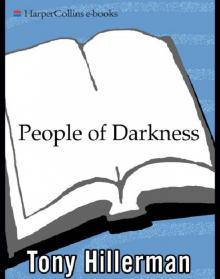 People of Darkness
People of Darkness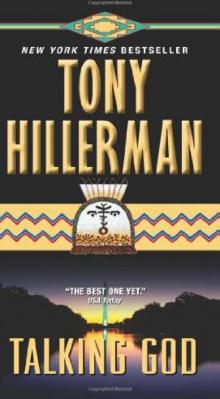 Talking God jlajc-9
Talking God jlajc-9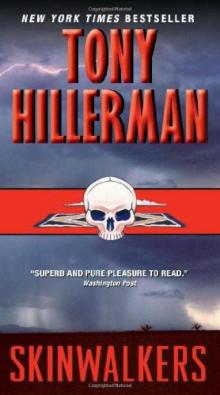 Skinwalkers jlajc-7
Skinwalkers jlajc-7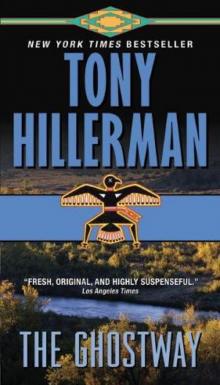 The Ghostway jlajc-6
The Ghostway jlajc-6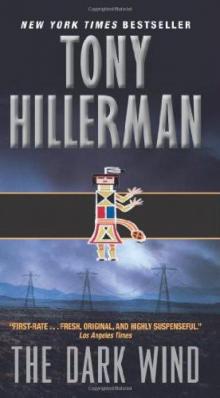 The Dark Wind jlajc-5
The Dark Wind jlajc-5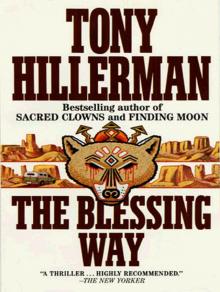 The Blessing Way
The Blessing Way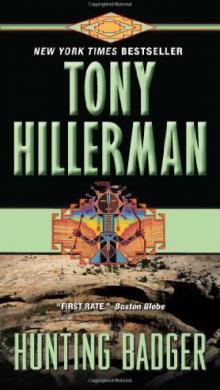 Hunting Badger jlajc-14
Hunting Badger jlajc-14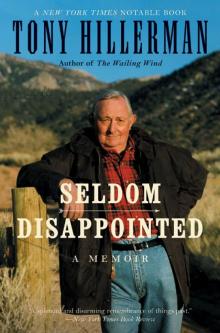 Seldom Disappointed: A Memoir
Seldom Disappointed: A Memoir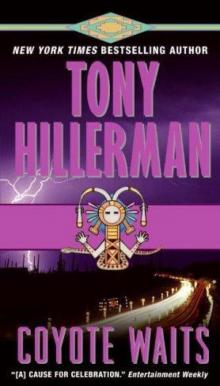 Coyote Waits jlajc-10
Coyote Waits jlajc-10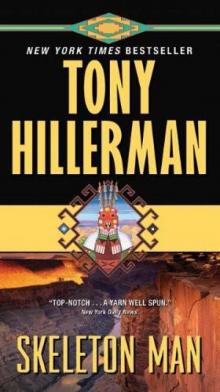 Skeleton Man jlajc-17
Skeleton Man jlajc-17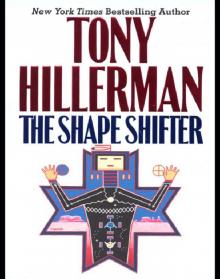 The Shape Shifter
The Shape Shifter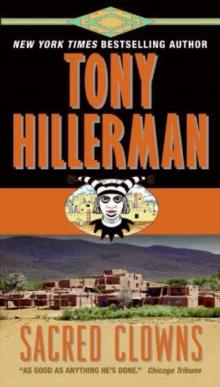 Sacred Clowns jlajc-11
Sacred Clowns jlajc-11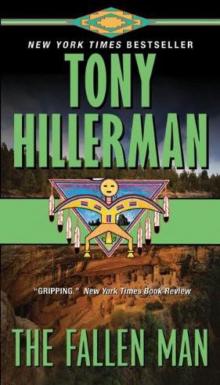 The Fallen Man jlajc-12
The Fallen Man jlajc-12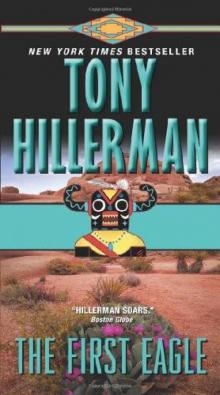 The First Eagle jlajc-13
The First Eagle jlajc-13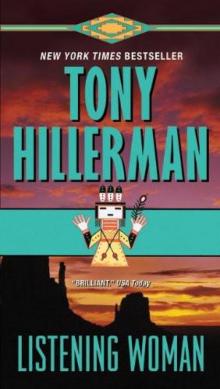 Listening Woman jlajc-3
Listening Woman jlajc-3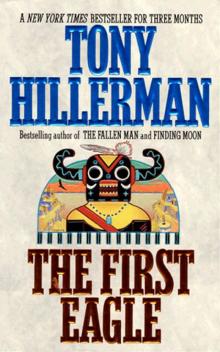 The First Eagle
The First Eagle Skeleton Man
Skeleton Man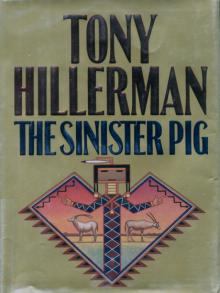 The Sinister Pig jlajc-16
The Sinister Pig jlajc-16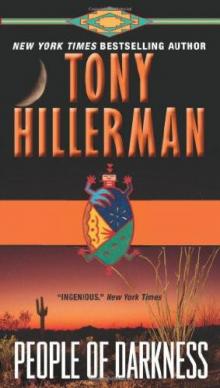 People of Darkness jlajc-4
People of Darkness jlajc-4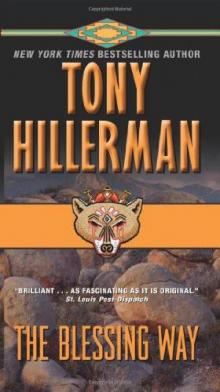 The Blessing Way jlajc-1
The Blessing Way jlajc-1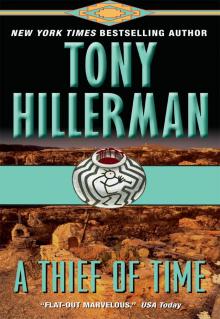 A Thief of Time
A Thief of Time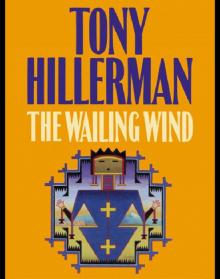 The Wailing Wind
The Wailing Wind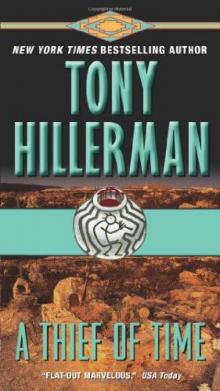 A Thief of Time jlajc-8
A Thief of Time jlajc-8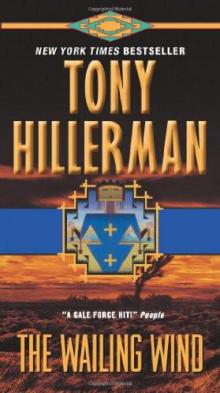 The Wailing Wind jlajc-15
The Wailing Wind jlajc-15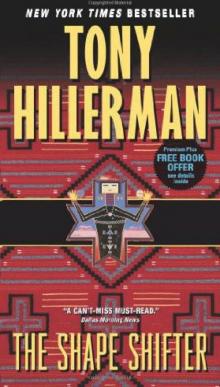 The Shape Shifter jlajc-18
The Shape Shifter jlajc-18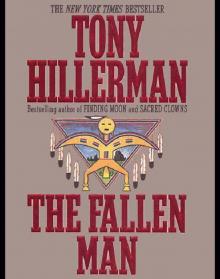 The Fallen Man
The Fallen Man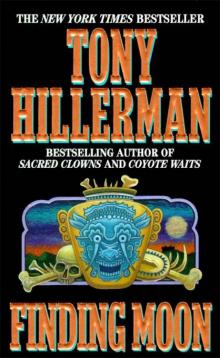 Finding Moon
Finding Moon